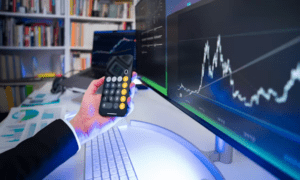Are you ready to unlock the secrets of successful investing? Look no further, because we’re here to spill the beans on the hottest trend in trading: Artificial Intelligence. In a world where every second counts and market fluctuations move faster than lightning, investors are turning to AI for that extra edge. Buckle up and join us as we delve into the fascinating realm where technology meets finance, unraveling why AI is becoming every investor’s secret weapon for scoring profitable trades. Get ready to revolutionize your portfolio with this game-changing advantage!
Introduction to Artificial Intelligence in Trading
Artificial Intelligence (AI) has been making waves across various industries, and the financial sector is no exception. In recent years, AI has gained significant traction in trading as more and more investors are turning to this technology for profitable trades.
But what exactly is AI in trading? How does it work? And why is it becoming increasingly popular among investors?
In this section, we will provide a comprehensive introduction to AI in trading. We will discuss what AI is, its applications in the financial markets, and how it can benefit traders and investors alike.
What is Artificial Intelligence?
Artificial Intelligence refers to the simulation of human intelligence processes by computer systems. It involves the development of intelligent machines that can perform tasks that typically require human intelligence, such as decision-making, problem-solving, and pattern recognition.
AI relies on advanced algorithms, data analysis techniques, and machine learning models to make decisions based on historical data and real-time market information. This enables AI systems to continuously learn from their experiences and improve their performance over time.
Benefits of Using AI for Investment Decisions
1. Data-Driven Decision Making:
One of the biggest advantages of using AI for investment decisions is its ability to analyze and process vast amounts of data in a fraction of the time it would take for a human to do so. This enables investors to make more informed and data-driven decisions, rather than relying on gut instincts or emotional biases.
2. Improved Accuracy:
AI algorithms are designed to continuously learn and improve over time, leading to more accurate and precise predictions and recommendations. By eliminating human errors and biases, AI can provide more reliable investment advice which can result in better returns on investments.
3. Speed and Efficiency:
With the use of AI, investment decisions can be made in real-time, based on up-to-date market trends and news. This allows investors to act quickly on potential opportunities or mitigate risks effectively. Moreover, with the automation capabilities of AI, manual tasks such as research and analysis can be performed at a much faster pace, freeing up time for investors to focus on other critical aspects of their portfolio.
4. Adaptability:
The financial market is constantly changing due to various factors such as economic conditions, political events, consumer behavior etc., making it difficult for humans to keep up with all these variables. However, AI has the ability to adapt and adjust its strategies based on real-time data changes effortlessly. This enables investors to have a dynamic approach towards their investments rather than relying on static decision-making processes.
Top AI Trading Platforms and Companies
The use of artificial intelligence (AI) technology in trading has become increasingly popular among investors. With its ability to analyze data, patterns and make predictions at a speed and accuracy beyond human capabilities, AI is revolutionizing the way trades are made.
In this section, we will take a closer look at some of the top AI trading platforms and companies that are leading the charge in this growing trend.
1. MetaTrader 5:
MetaTrader 5 is a popular AI-powered platform used by traders worldwide. It offers features such as automated trading using algorithms and advanced risk management tools. One of its key advantages is the ability to create custom indicators and expert advisors, which can be shared among users for free or for a fee. Furthermore, it has an intuitive user interface and supports multiple asset classes including stocks, forex, commodities, and cryptocurrencies.
2. Trade Ideas:
Trade Ideas is another powerful AI platform that helps traders identify profitable opportunities in real-time. The platform uses machine learning algorithms to scan thousands of market variables every second, providing users with actionable insights based on their chosen criteria. Its unique feature “Holly,” an AI virtual analyst, creates potential trade ideas based on user-defined parameters while also considering current market conditions.
3. Kavout:
Kavout is an innovative AI company that combines advanced technologies like deep learning and predictive analytics to provide personalized investment recommendations to traders. Their flagship product K Score leverages big data analysis to evaluate stock prices against fundamental measures such as revenue growth, profitability ratios , and market trends to provide traders with a comprehensive score for trading decisions.
4. QuantConnect:
QuantConnect is an open-source AI-powered trading platform that enables users to create, backtest and implement automated trading strategies. The platform boasts a community of over 65,000 algorithmic traders and provides access to historical data, live market data, and analytics tools. They also offer cloud-based deployment for easy scalability and real-time monitoring of strategies.
5. Renaissance Technologies:
Renaissance Technologies is one of the most successful AI-driven hedge funds in the world. Their flagship fund Medallion uses complex algorithms to analyze and trade on various financial markets. While their strategies are proprietary, they are known for their high returns and have been a pioneer in using AI technology in investment decisions.
6. Sentient Technologies:
Sentient Technologies is a leading AI company that offers AI-powered trading solutions through its flagship product, Sentient Investment Management (SIM). SIM combines deep learning models with evolutionary algorithms to analyze large datasets and make investment decisions across multiple asset classes including stocks, currencies, commodities, and futures.
Case Studies of Successful AI Trades
The rise of artificial intelligence (AI) in the financial sector has caused a major shift in the way investors approach trading. With its ability to process and analyze large amounts of data at lightning speed, AI is being utilized by more and more investors to gain an edge in the market. In this section, we will delve into some specific case studies of successful AI trades that showcase the advantages and effectiveness of utilizing AI in trading.
1. Renaissance Technologies:
One of the earliest adopters of AI in investing, Renaissance Technologies’ Medallion Fund has achieved remarkable success through its use of mathematical models powered by machine learning algorithms. It’s reported that over a 30-year period, the fund has generated average annual returns of 66%, significantly outperforming other traditional hedge funds. The use of AI allows Renaissance Technologies to capitalize on market inefficiencies and make lightning-fast trades, giving them a significant advantage over human traders.
2. Bridgewater Associates:
Another top hedge fund known for its extensive use of AI is Bridgewater Associates. Its co-founder Ray Dalio credits much of their success to their proprietary algorithm-based investment strategy called “Pure Alpha.” This strategy uses machine learning algorithms to continuously analyze market data and make data-driven decisions on future trades. Since implementing this approach in 2005, Pure Alpha has yielded annualized returns of over 14%, solidifying Bridgewater Associates as one of the most successful hedge funds using AI technology.
Potential Risks and Disadvantages of Using AI in Trading
As with any emerging technology, there are always potential risks and disadvantages associated with using AI in trading. While the use of AI in investing has grown significantly in recent years, it is important to be aware of these risks and address them accordingly. In this section, we will discuss some of the key challenges that investors may face when implementing AI systems for trading.
1. Data Bias:
One of the biggest concerns with using AI in trading is the potential for data bias. This occurs when the algorithm used to make investment decisions is trained on historical data that may reflect biases or anomalies from past market conditions. For example, if the training data was collected during a period of economic boom, the algorithm may not accurately predict market trends during a downturn. This can lead to inaccurate investment decisions and potential losses.
2. Lack of human oversight:
While AI can process vast amounts of data at an incredible speed, it lacks emotional intelligence and intuition that humans possess. This means that relying solely on AI for trading decisions could overlook critical factors such as external events or breaking news that impact markets. Without human oversight, an unanticipated event could trigger irrational trades leading to significant losses.
3.Legality and ethical concerns:
The use of AI in trading raises questions surrounding legality and ethics. Certain countries have regulations around the use of algorithms in financial markets, especially those involving high-frequency trading strategies which can manipulate market movements. Additionally, there are concerns about transparency – investors want to know how decisions are made by an AI system before they trust it with their money.
4. Technical glitches and system failures:
As with any technology, AI systems are not infallible and can experience technical glitches and system failures. These issues can potentially lead to incorrect or erratic trading decisions, resulting in significant financial losses. While these risks can be mitigated through thorough testing and monitoring, they cannot be completely eliminated.
5. Cost implications:
Implementing AI systems for trading can be costly, especially for smaller investors. Developing and maintaining the technology requires significant resources and expertise, making it less accessible for those with limited funds.
6. Dependency on third-party systems:
Many AI systems used for trading rely on data from third-party sources such as news feeds or social media platforms. This means that any issues or inaccuracies with these sources could impact the performance of the AI system and potentially lead to incorrect investment decisions.
7. Potential for market manipulation:
The speed at which AI algorithms can analyze data and execute trades presents a risk for market manipulation. High-frequency trading using AI may distort prices or create artificial demand, causing instability in the market.
How to Incorporate AI into Your Investment Strategy
There are a few key steps that investors can take to incorporate artificial intelligence into their investment strategy. These steps involve understanding the basics of AI, identifying potential use cases for AI in investing, and executing a plan for implementing AI technology.
1. Understand the Basics of AI
Before diving into incorporating AI into your investment strategy, it is important to have a basic understanding of what AI is and how it works. Simply put, artificial intelligence refers to technologies that are able to perform tasks typically requiring human intelligence, such as learning, problem-solving, and decision making. This includes machine learning algorithms that can analyze large amounts of data and identify patterns or make predictions based on that data.
2. Identify Potential Use Cases for AI in Investing
The next step is to identify where exactly you could utilize AI technology in your investment decisions. Some common use cases for AI in investing include:
– Predictive analysis: Using machine learning algorithms to analyze vast amounts of financial data and make predictions about market trends or stock prices.
– Portfolio optimization: Utilizing various optimization techniques using advanced algorithms to allocate assets most efficiently.
– Risk management: Implementing risk management strategies by predicting downside risks through historical data analysis.
– Automated trading: Using algorithmic trading systems powered by artificial intelligence to execute trades automatically based on predetermined criteria.
These are just some examples; the possibilities for utilizing AI in investing are endless and constantly evolving as new technologies emerge. It’s essential to assess your own investment goals and needs when exploring potential use cases for incorporating AI in your investment plan.
Future Outlook for AI in the Stock Market
The emergence of artificial intelligence (AI) has revolutionized various industries, and the stock market is no exception. With its advanced algorithms and vast computing power, AI technology has shown great potential in making profitable trades in the stock market. In this section, we will explore the future outlook for AI in the stock market and how it is changing the game for investors.
One of the main advantages of AI in the stock market is its ability to process and analyze huge amounts of data within seconds. This means that AI-powered trading systems can quickly identify patterns and trends in market data that would be nearly impossible for a human to detect on their own. As a result, AI can make more accurate predictions about future market movements based on historical data, which can lead to more informed investment decisions.
Furthermore, one key trend that is expected to continue shaping the future outlook for AI in the stock market is machine learning. Machine learning algorithms enable computers to learn from data without being explicitly programmed, meaning they can continuously improve their performance with each new piece of information they receive. This allows for more sophisticated analysis and faster adaptation to changing market conditions.
Another factor contributing to the growing adoption of AI technology in the stock market is its ability to reduce human bias and emotion from trading decisions. Traditional investment strategies are often influenced by emotions such as fear or greed, leading investors astray from rational decision-making processes. However, AI-powered systems make decisions based solely on data-driven analysis without being influenced by emotions or other human factors.
Conclusion
As technology continues to advance, the use of artificial intelligence has become increasingly prevalent in all industries. In the world of finance and investing, AI offers a significant advantage by rapidly analyzing large amounts of data and providing accurate predictions for profitable trades. This trend is only expected to grow as more investors realize the potential of AI in their strategies. With its ability to process vast amounts of information and adapt quickly to changing market conditions, it’s no surprise that more and more investors are turning to artificial intelligence for successful trading decisions. So if you want an edge in the competitive world of investing, embracing AI may be your key to success.



































